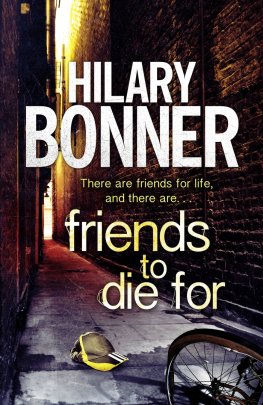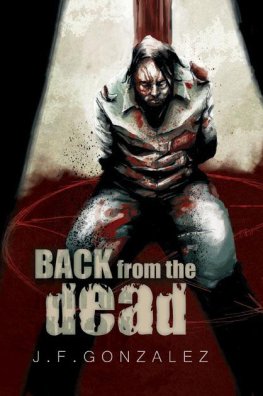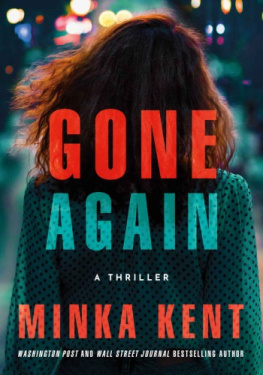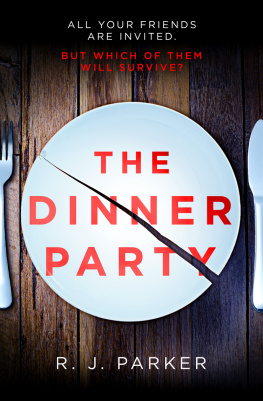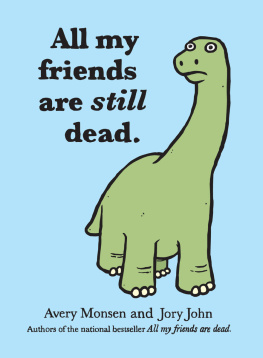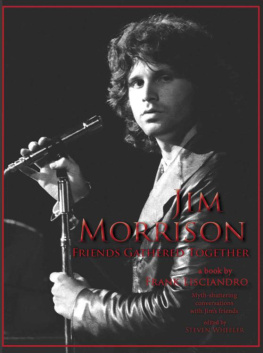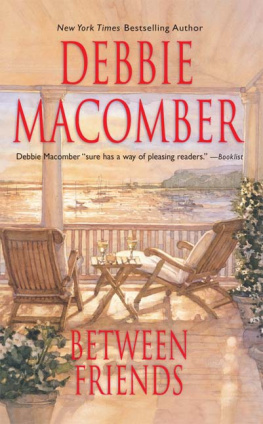Hilary Bonner
Friends to Die For
Ingrids heart was singing as she walked up the Caledonian Road. Even the inconvenience caused her by the closure of Kings Cross Station due to a bomb scare could not dampen her spirits.
Security alerts of this kind were rare in London in the autumn of 1998. This was the year the Good Friday Agreement had more or less brought IRA terrorist attacks on the UK mainland to an end, and three years before 9/11 would herald a whole new era of al-Qaeda terrorism.
Ingrid had no idea just how unlucky she was to be caught up in one, any more than she realized that her luck was about to desert her completely. Her thoughts were full of the momentous decision she had made, and how her parents in Sweden would react when they received the letter she had finished that morning.
It was just gone 10 p.m. After completing her shift as a student nurse at University College Hospital thirty minutes earlier, Ingrid had as usual made her way to Kings Cross underground in order to board a Piccadilly Line train to Wood Green, where she was staying for the duration of her training with a cousin of her mothers.
This accommodation arrangement had been a condition laid down by her parents when Ingrid had expressed a wish to come to London in order to gain what she felt was the best possible nursing training at one of the citys great teaching hospitals. Most of the other young nurses shared flats or rooms, but Ingrid had been happy to conform with her parents wishes. She knew she wouldnt have fitted in. Even in Sweden, she had always been different.
At nineteen she was still a virgin, with no interest in boys. Or girls. Her passion was the Lutheran Church, to which her mother had introduced her when she was a child. She now knew beyond a doubt that she wanted to make the ultimate commitment to her Church. She believed that was the way she could make best use of the nursing skills she was still in the process of acquiring.
And today she had written to tell her parents that when she finished her training she was going to become a Lutheran nun.
She knew that her parents would not be too surprised, although she suspected that her farmer father might regret that his clever only child would not now give him grandchildren. He would support her, though. He always did.
It was as if the act of posting the letter had made it official. Once shed dropped it in the postbox opposite the station she was far too excited to join the other commuters milling around the bus stops and trying to hail taxis. Police manning hastily erected barriers at the station entrance were advising passengers that a limited underground service was still running from nearby stations, so Ingrid set off for Caledonian Road, the next stop on the Piccadilly Line heading towards Wood Green. She reckoned she could walk there in fifteen minutes.
The area immediately around the station was rapidly being shut off as police reinforcements arrived, so Ingrid got out her pocket A Z and made a detour into Pentonville Road and along Northdown Street into the Caledonian Road. What Ingrids A Z failed to tell her was that the Cally Road, as locals called it, was a notorious red light district. The regeneration of Kings Cross had begun a few years earlier, but much of the Cally Road remained a wasteland of derelict buildings and flattened empty ground awaiting redevelopment.
Ahead of her was a road junction known as Class A Corner. It was where the prostitutes met the drug dealers in order to exchange the proceeds of one vice for the product of another.
Ingrid wore her long white-blonde hair in a tight bun when she was on hospital duty. She never found this entirely comfortable. With one hand she released the constraints of the bun, as she often did on the way home, and allowed her hair to fall onto the shoulders of the black coat covering her nurses uniform.
Almost immediately a car pulled to a halt alongside her. The passenger window was lowered. A mans head appeared.
Looking for business, darling? he enquired.
Ingrid was shocked. She knew exactly what was being suggested and what kind of woman the man had taken her for. She hadnt led that sheltered a life, and she was Swedish, after all.
No, no, she replied, almost screaming the words, her voice sharp and high-pitched.
The man drove off at once.
Ingrid wrapped her coat tightly around herself. She was shivering. It was a cold damp November night, but she realized it was her sudden nerviness rather than the chill in the air that was causing her body to tremble.
She peered up and down the Caledonian Road. It wasnt well lit in those days. However, in the glare of the headlamps of passing vehicles, she could clearly see a young woman on the opposite side of the road wearing an imitation fur coat pulled down off one shoulder to reveal bare flesh.
A saloon car stopped alongside. The woman opened the passenger door and climbed in.
Ingrid was well aware now of the kind of district she had unwittingly wandered into. There were shadowy figures gathered on a piece of wasteland to her left, and another in a doorway just ahead. She considered turning back. But there was a brightly lit stretch of road not far away. Desperate to get home, she hurried towards it.
The blow caught her on the side of her head. She registered that she had been hit by a heavy object before falling, partly concussed, to the pavement.
She felt herself being dragged by the shoulders, somewhere away from the main road to a place where there was even less light. Her whole body hurt already, and the rough ground beneath cut into her. But she did not cry out. She was dumb with fear.
Then her assailant let go of her, but remained, apparently caped and hooded, looming above her. She tried to make out a face. The light was not bright enough. But she could see the eyes shining through the gloom. There was not a trace of humanity in them.
Ingrid cowered before her attacker. She wanted to pray but was unable to. She tried to crawl away, even though she knew it was hopeless. Her body seemed incapable of movement. She tried to beg for mercy but could not speak. All she could do was wait for the inevitable.
And a few minutes later Ingrid was dead.
The early Sunday supper at Johnnys Place in the heart of Covent Garden was a casual arrangement but a ritual nonetheless. Every week at five thirty the staff set up a long table along one wall at the back of the restaurant for the group that had become known as Sunday Club. As the evening wore on the friends would turn up as and when they could, with seating and table places readjusted as it eventually became apparent how many they would be.
Rather unusually, on this particular Sunday all ten of the group were present.
Tiny, a six-foot-six-inch man-mountain of West Indian descent, and his partner Billy were the first to arrive. As usual, Tiny gravitated to a place at one end of the table where his massive bulk would have room to spread. He had no hair at all on his head, which glistened like a large polished ebony orb resting atop broad shoulders, his jacket falling open to reveal an expansive chest, muscles bulging beneath his Gucci T-shirt. At a glance he looked thoroughly threatening, but his eyes were gentle.
In the seat next to Tiny, one small white hand placed possessively on the big mans denim-clad knee, sat Billy, a diminutive City lawyer in a business suit by day and a bit of a raver at night. With his free hand Billy stroked his neat brown moustache, making sure no hair was out of place. Everything about Billy was neat and organized, except perhaps his relationship with Tiny whom hed met at Cloud Nine, the gay nightclub where Tiny worked as a bouncer, or door supervisor, the job description preferred by the Security Industry Association of which the big man was an active member.

